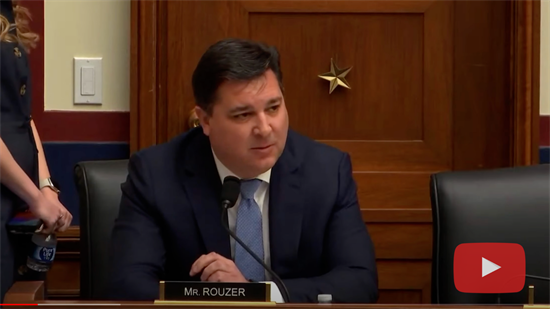WASHINGTON, DC - This week, Water Resources and Environment Subcommittee Chairman David Rouzer (R-NC-07) joined the Coast Guard and Maritime Transportation Subcommittee hearing examining the threats to shipping in the Red Sea due to Iranian-backed Houthi attacks against civilian and military vessels.
Chairman Rouzer emphasized how these disruptions are threatening supply chains and sought answers on the impact delayed shipments are currently having on the global economy as well as consumers. Chairman Rouzer also questioned witnesses on how Congress can best prepare for congestion issues at U.S. ports in the coming months if attacks continue in the Red Sea and Suez Canal.
This week, Chairman Rouzer and the co-chairs of the Supply Chain Caucus, of which Mr. Rouzer is a founder, sent a letter to the Biden Administration requesting continued efforts and oversight to secure the Red Sea shipping lanes and restore the safe passage of trade in the region.
Click here or on the image above to watch Rep. Rouzer's full remarks.
Key Takeaways:
Rouzer emphasized just how critical the Red Sea and Suez Canal are to an efficient global supply chain and raised concerns about the impact delayed shipments have on the global economy.
- Dr. Ian Ralby, Chief Executive Officer, I.R. Consilium stated in his testimony: "The nature of global commerce makes this situation a major threat to the world’s economic stability as well as critical supply chains and desperately needed humanitarian assistance. According to the accounting firm Ernst and Young, the six days during which the EVER GIVEN was famously stuck in the Suez Canal in March 2021 cost the shipping industry $416 million per hour. The costs of the Houthi attacks, however, will be far greater and will, as a result, be passed on to consumers throughout the world.
- Dr. Ralby continued: The cost of everything is likely to increase, given the integrated nature of supply chains. Disrupting the 30% of global container traffic that traverses the Red Sea will therefore have a greater impact on the economy than the 10% of oil that traverses the same passage."
Rouzer asked how Congress can best prepare for the congestion issues at U.S. ports in the coming months if attacks continue in the Red Sea and Suez Canal.
- In response, Jonathan Gold, National Retail Federation, outlined: “The biggest issues right now is…to keep making investments on land-side infrastructure, but must work through the operational issues causing congestion issues we saw during the pandemic. We need to ensure all stakeholders—carriers, terminals, drayage trucks, railroads, warehouse, and shippers are all communicating with each other so we have equipment like chassis and railcars readily available when they need to be so we avoid congestion.”
- Gold also outlined during his testimony how the U.S. can prepare for congestion issues at U.S. ports: "Many shippers are looking to shift back to the West Coast ports. Unfortunately, this shift may cause congestion at those ports if they are not properly planning for the surge in cargo. We know a significant amount of cargo shifted away from the West Coast during the most recent labor negotiations. That cargo may shift back, so we need to make sure our ports, terminals, railroads, drayage providers and warehouses are ready for the increased volumes."
- Mr. Charles "Budd" Darr, Executive Vice President, Mediterranean Shipping Company stated in his testimony: "We are hopeful that the Congress’s subsequent investments in U.S. port and land-side infrastructure will at some point provide additional capacity and resiliency to handle similar future supply and demand surges caused by geopolitical and other unanticipated major events...We assess that if we can continue to access U.S. ports uninterrupted, we have sufficient assets and capacity for the foreseeable future to ensure U.S. importers and exporters access to global markets."



